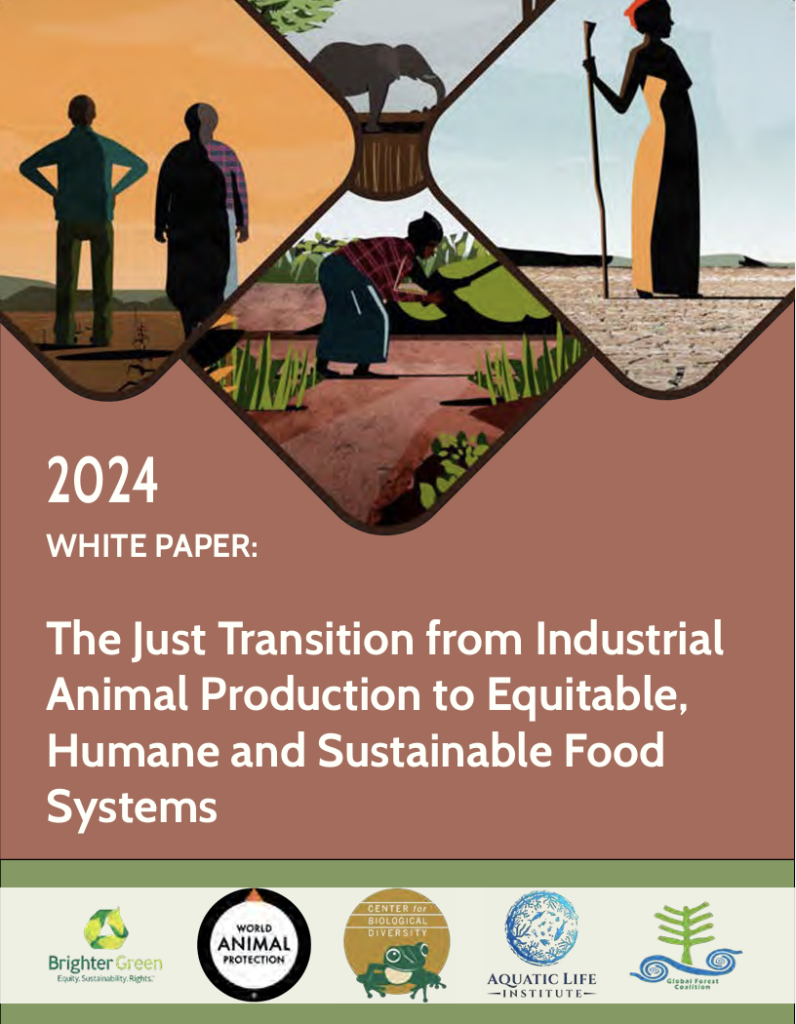Despite mounting evidence of its disastrous impacts, industrial animal production continues to expand, driving deforestation, habitat destruction, and pollution. This rampant growth poses a grave threat to our planet’s climate, with global food system emissions alone endangering the 1.5°C climate target, even if we phase out fossil fuels immediately. This alarming situation demands urgent action for a “just transition” towards an equitable, humane, and sustainable food system.
Reducing the size of the industrial animal agriculture, fishing, and aquaculture sectors, together with a shift towards diets within planetary and social boundaries and agroecology, must become a central climate mitigation strategy.
To make more concrete what this “just transition” would look like, and which policy actions are needed most urgently to bring it about, Brighter Green joined World Animal Protection, the Center for Biological Diversity, the Aquatic Life Institute, and Global Forest Coalition to create the Just Food Transition white paper and Roadmap, in late 2024.

This paper, which is available in several languages as an executive summary and a full white paper, unites civil society organizations around the world dedicated to a common vision of food system transformation from farm to fork that protects and empowers smallholders, pastoralists, peasants, fisherfolk, farm and food chain workers, women, Indigenous, youth, people of color, and other marginalized communities and makes a livable future on our planet possible.

To be true to the principle of just transition (which requires a fair and equitable process), the white paper text is the result of extensive consultation among frontline communities and impacted groups with over 120 individuals representing 72 organizations, from youth, women, farmer, and worker constituencies across 35 countries. Their feedback and voices are reflected in the final paper. (The first of these consultations was held at the UN climate summit, COP28, in December 2023. See photo above.)
The paper, which reflects many of Brighter Green’s policy priorities, establishes a global framework to guide the development of local roadmaps tailored to regional contexts, cultural sensitivities, and community-based solutions. The future we advocate for is a phaseout of industrial animal agriculture, fishing, and aquaculture through a just transition to a climate-resilient, locally and democratically governed food system that mitigates greenhouse gas emissions, promotes biodiversity, protects animal welfare, empowers workers, and advances food sovereignty that fulfills food security.
To bring about this transition, the paper proposes three key “levers of change.” These are, to:
- Strengthen food system governance: We must challenge the dominance of the food system by multinational corporations and put policies in place to foster transparency and hold them accountable for their social and environmental impacts. At the same time, we should support environmentally and socially responsible companies and protect and elevate traditional and local food systems.
- Promote agroecological practices: A just transition necessitates the embracing of agroecology to promote human rights, environmental protection and animal welfare, and to ensure food sovereignty meets food security needs while providing dignified and sustainable livelihoods.
- Shift towards diets within planetary and social boundaries: Countries with high per capita consumption of animal-based products must transition to plant-rich diets with reduced meat and dairy to stay within planetary and social boundaries. This shift will benefit public health and free up land and resources to support diversified agroecological production systems.
The roadmap includes more than a hundred specific policy recommendations that will vary in priority, relevance, and applicability, depending on local and regional contexts: including current legislation, cultural sensitivities, community-based solutions, levels of consumption and production of animal-sourced foods, and how entrenched industrial animal agriculture is in the region.
The paper and roadmap have been translated into Spanish, French, Portuguese, and Thai, and is in the process of being localized to regional contexts in Togo, Kenya, Nigeria, and the U.S., with localization in Asia and two Latin American countries forthcoming.
The project partners are continuing to socialize the white paper across the food systems and climate movement and getting more endorsements, and more localizations at national levels are to come. Groups are already using the paper in national advocacy and UNFCCC (UN climate change convention) policy and advocacy spaces. We plan to continue building out resources, including evidence through research and case studies demonstrating the viability of equitable, humane, and sustainable food systems to feed the world, and providing support for people localizing and utilizing the paper.
And we’re planning for the road to the 2025 UN climate summit to be held in Belem, Brazil (COP30), where we plan to bring together many of the people at local and national levels around the world who have been leading on this project in a unified call for the phase out of industrial animal agriculture. The urgency of this just transition cannot be overstated. The consequences of inaction are dire, from irreversible biodiversity loss and climate catastrophe to human rights abuses, public health crises, and widespread animal suffering.
